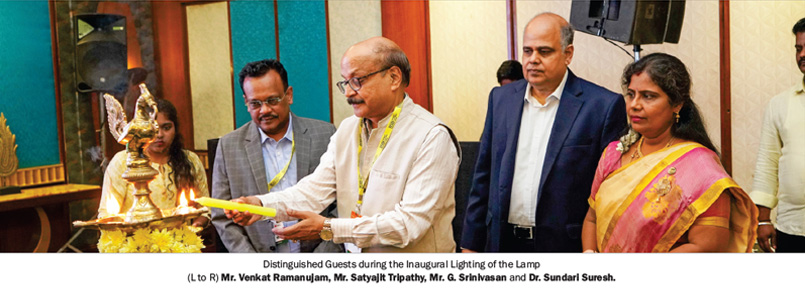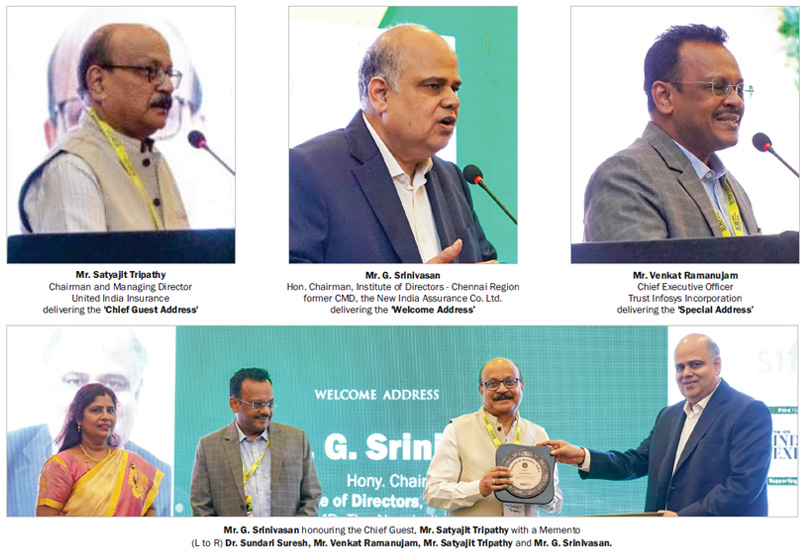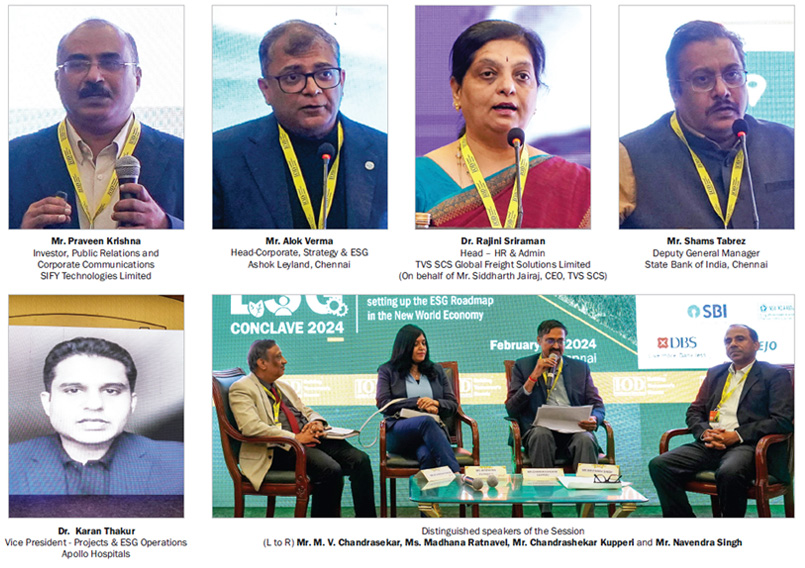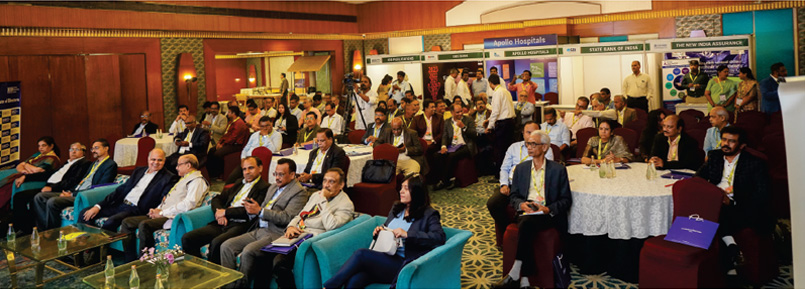Regional Directors ESG Conclave 2024

The Institute of Directors, India – Chennai Region, organised the Regional Directors' ESG Conclave at Hotel GRT Grand, Chennai, Tamil Nadu on February 24, 2024. The theme of the Conclave was 'Board as a Mentor in setting up the ESG Roadmap in the New World Economy'. Many distinguished speakers, senior government officials, directors, and key decision-makers from various companies attended the conclave.
The Inaugural Session commenced with the customary lighting of the lamp of knowledge, and the rendition of the Tamil Thai Vazhthu.
The 'Welcome Address' was delivered by:
Mr. G. Srinivasan
Honorary Chairman – Chennai Region, Institute of Directors
former CMD, the New India Assurance Co. Ltd.
Mr. Srinivasan emphasised that ESG is gaining lots of focus and companies need to create value in the market to gain the assurance of the stakeholders. He elaborated on the different aspects contributing to the factors of Environment, Social and
Governance. The key question to be addressed is whether a board room has to address ESG. He said that regulators across the world are driving the organisations and putting in lots of pressure. A company model should be based mainly on a 'top down model', and sensitization is important in company management. The company board has to channel carbon credit, fossil fuels, green investment, and, in turn, the amount of investment in ESG. The board should develop a road map to achieve organisational success.
This was followed by the 'Chief Guest Address' delivered by:
Mr. Satyajit Tripathy
Chairman and Managing Director - United India Insurance
Mr. Tripathy discussed Boardroom operations of insurance companies. He said that SEBI is playing a crucial role in ESG, and ensuring ESG regulations. RBI recently released s significant regulation about the ESG boardroom framework revising on annual basis. The 'option of green bond' plays a pivotal role of investment. Investor pressure, institutional fund and stake holders' expectations have made for corporate importance of ESG. Board members have a responsibility to integrate ESG regulations and monitor processes in ESG. For a sustainable company, the board has to take the responsibility of ESG culture. Board has to setup an ESG road map and challenge and address the stakeholders. Financial sector will be the last to be affected in the ESG role. Most of the companies integrate business processes that are sustainable. Countries of large listed ESG Companies will play a pivotal role.


This was followed by the 'Special Address’ was delivered by:
Mr. Venkat Ramanujam
Chief Executive Officer - Trust Infosys Incorporation
Mr. Ramanujam spoke on the theme 'ESG Map for COP 33'. He highlighted the advantages of migrating to Rs. 2 per electricity unit in the stand-alone, roof-top green energy sector towards India achieving its carbon emissions UNFCCC target: a pragmatic ESG roadmap for COP 33.
Dr. Sundari Suresh, Regional Manager, Institute of Directors, Chennai Region, proposed the 'Vote of Thanks'. She discussed the theme of the conclave and thanked all the guests, dignitaries, participants, speakers, and valuable partners for the success of the event. She said that environmental, social, and governance (ESG) data has emerged as a pivotal tool in evaluating companies' sustainability performance, assessing their impact on the environment, societal relationships, and governance structures. The goal of ESG is to capture all the non financial risks and opportunities inherent to a company's day-today activities. The adoption of frameworks from organisations like GRI, SASB, and TCFD ensures standardized assessment, fostering consistency across diverse industries.
PLENARY SESSION
The 'Keynote Address' was delivered by:
(1.) Mr. Praveen Krishna
Investor & Public Relations & Corporate communications - SIFY Technologies Limited
(2.) Mr. Alok Verma
Head-Corporate, Strategy & ESG - Ashok Leyland, Chennai
(3.) Dr. Rajini Sriraman
Head – HR & Admin - TVS SCS Global Freight Solutions, Ltd.
(4.) Mr. Shams Tabrez
Deputy General Manager - State Bank of India, Chennai
(5.) Dr. Karan Thakur
Vice President- Projects & ESG Operations - Apollo Hospitals
Mr. Krishna spoke on the theme 'Sustainability Journey: Taking the First Steps'. He claimed that there was more pressure to report because Sify is a NASDAQ-listed firm. He defined sustainability as the ability to meet the current needs of society without compromising the ability of future generations to meet their own needs. He said that the goal of ESG is to capture all non-financial risks and opportunities inherent to a company's day-to-day activities. 'SIFY' was aware of the many moving components and the ESG roadmap. A sustainability map was constructed from the moving components, which in turn led to the sustainability target. He said that intent, leadership, milestones, and timelines are micro-factors leading the talk to investors. Intent becomes action; leadership tells us what we want to see; mentoring is traveling along with you, which takes action; and these can be broken down into strategic parts and operational parts. If the sustainability mapping and intent are in place, then investors will be willing to invest in a company.
Mr. Verma spoke on the theme, 'Developing a robust roadmap to Net Zero'. He shared his insights on the ESG journey of Ashok Leyland. He said that Ashok Leyland started with a review of the product 'Gold Ship' to meet the needs of industries with fuel in electrical vehicles, LNG, hydrogen, and hydrogen CV. Signed for net zero by 2048, the year Ashok Leyland will be 100 years old. He said that the organisation has been through the journey of seven sustainability reports and has encouraged people to see their journey. Broadly, Ashok Leyland focuses on 10 areas of ESG. He added that three key areas of ESG, mainly carbon neutrality, CSR, and governance, will make a difference in disclosures, initiatives of partnership, and defining the overall roadmap of an organisation.
Dr. Sriraman, on behalf of Mr. Siddharth Jairaj, Chief Executive Officer, TVS SCS, spoke on the theme, 'ESG: A Case Study'. She explained the transition of the CSR to ESG journey of TVS SCS. She said that TVS Supply Chain is a newly listed company that will begin ESG reporting this year, in 2024. She narrated that a century ago, Mr. Sundaram Iyengar, the creator of TVS, was also a pioneer of ESG. When he first established TVS, he had a brilliant idea to store a magnet beneath the vehicle, which would travel the bus route and collect iron fragments. He had many such innovative ideas with respect to ESG. She shared his mantra for success, i.e., “take risk, and success will follow." She also said that the CEO of TVS SCS, Mr. Sidharth Jairaj, set the benchmark for ESG and identified its lead indicators. She added that it is very important for a business to be aligned with its ESG strategies, especially for logistics companies. She mentioned that TVS is a purpose-driven workplace and outlined various initiatives that the organisation has undertaken since 2014, such as planting trees, funding the poor, helping with surgeries, and educating children and women. She also mentioned that TVS SCS is a non-plastic company whose major philosophy is to invest in the environment, as they are importers and exporters through the road, sea, and air.
Mr. Tabrez spoke on the theme 'SBI's contribution to renewable energy and climate finance'. He outlined the many ways SBI is contributing to ESG and climate finance. He said that Tamil Nadu is an industrial state, has the second-largest economy in the country, is the third-largest exporting state in the country, and contributes 53% to the total renewable energy sector. India is ranked the 5th most vulnerable country to the effects of climate change. So, the need is for climate finance and green finance. India is planning for net zero carbon emissions by 2070. SBI aims to be carbon neutral by 2030 and is dedicated to focusing on climate change, aligning its policy, production, and operation with ESG. In this connection, a climate finance meeting on ESG was initiated to develop a climate change risk mitigation policy. SBI is tied up with the World Bank, ADB, etc. to facilitate a lower cost of climate finance. SBI's mission is to be net zero by 2030 with regards to Scope 1 and Scope 2 emissions. Further, it will utilize green deposits and invest in ESG projects. SBI also offers easy access to loans up to Rs 5 crore without the help of AI and ML.
Dr. Thakur spoke on the theme, 'Creating governance mechanisms to ensure ESG success: A healthcare perspective'. According to him, corporate existence would be dominated by ESG in the coming years, given its increased significance in the last few years. ESG and sustainability are not new concepts and have really come to become center stage for corporate governance professionals. ESG and sustainability are here to stay and will impact corporate directors, management, and our entire stakeholder engagement, as well as help create shareholder value in the process. The enhanced focus on sustainability and ESG is compelling companies to change their reporting paradigm in terms of what they want to disclose and what all needs to be disclosed under the BRSR. India has placed a great deal of attention on environmental issues, with the national government and state governments setting very strict goals to meet in terms of renewable energy, net zero energy, and energy efficiency, which is advancing the climate agenda and making it a global leader in sustainability.

Panel Discussion: ESG: Navigating Challenges and Embracing Opportunities
The Panel Session was moderated by:
Mr. Chandrashekar Kupperi
Founder - Anova Corporate Services Pvt. Ltd.
The distinguished speakers of the Session were:
(1.) Mr. M. V. Chandrasekar
Deputy General Manager - The New India Assurance Co. Ltd.
(2.) Ms. Madhana Ratnavel
Director, Veppalodai Salt Corporation - KSPS Green Infrastructure Pvt. Ltd & Member – CII Tamil Nadu Climate policy & ESG advisory panel
(3.) Mr. Navendra Singh
Head Support Services (EHS, QA/QC, P&M) - Larson & Toubro
Mr. Kupperi moderated the panel discussion by welcoming the panelists and thanking the organisers for the choice of topics. He said that ESG is not a mere trending word but is to be considered a transformative journey towards a more sustainable and equitable future. He then engaged with the panelists.
Mr. Chandrasekar said that the primary goal of New India Assurance is to offer financial security and lessen the uncertainties that people and organisations encounter at different points in time. He added that important things are raising awareness, making available the appropriate product at the right price, and improving accessibility. He stated that strict requirements for pollution control certification should be put in place in order to safeguard the environment. Regarding the challenges faced, he stated that there is a shortage of skilled.
Our Gold Partners:
(1.) Apollo Hospitals
(2.) Medi Assist
Our Silver Partner:
(1.) Sify Technologies
Our Supporting Partners:
(1.) State Bank of India
(2.) The New India Assurance Co. Ltd.
(3.) DBS
(4.) Thejo Engineering Limited
(5.) ANOVA
Our Print Partner:
(1.) The New Indian Express
This report is compiled by:
Dr. Sundari Suresh
Regional Manager - Institute of Directors - Chennai Region
GLIMPSES OF AUDIENCE

PARTNERS & SUPPORTERS

Author

Institute of Directors India
Bringing a Silent Revolution through the Boardroom
Institute of Directors (IOD) is an apex national association of Corporate Directors under the India's 'Societies Registration Act XXI of 1860'. Currently it is associated with over 31,000 senior executives from Govt, PSU and Private organizations of India and abroad.
Owned by: Institute of Directors, India
Disclaimer: The opinions expressed in the articles/ stories are the personal opinions of the author. IOD/ Editor is not responsible for the accuracy, completeness, suitability, or validity of any information in those articles. The information, facts or opinions expressed in the articles/ speeches do not reflect the views of IOD/ Editor and IOD/ Editor does not assume any responsibility or liability for the same.

 Quick Links
Quick Links
 Connect us
Connect us




 Back to Home
Back to Home






























